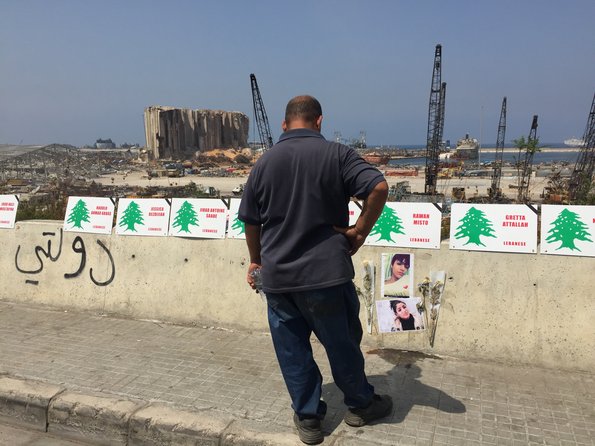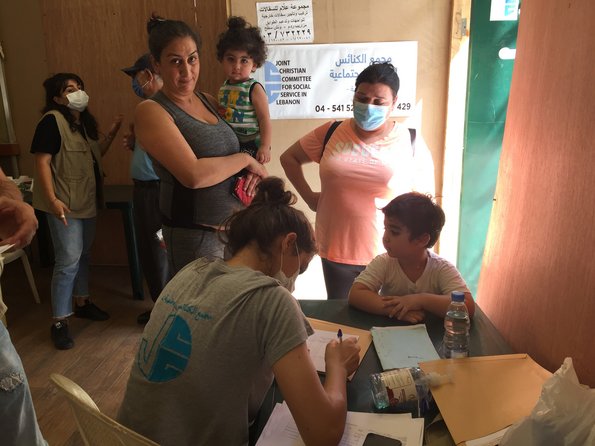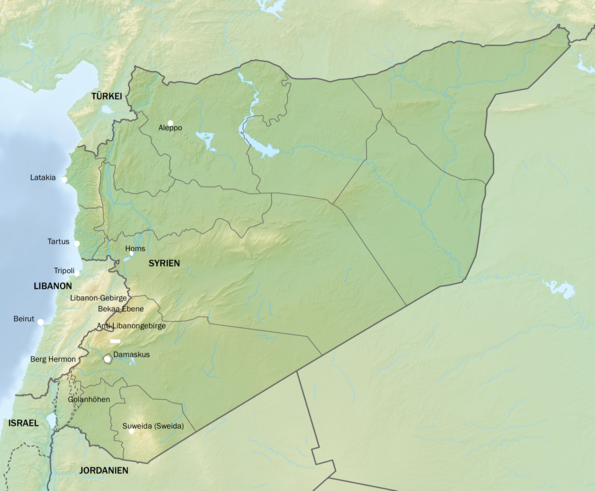The everyday shortage
Lebanon, formerly the “Switzerland of the Orient”, is sinking into political chaos and economic hardship
by Karin Leukefeld, Bonn and Damascus
The economic situation in Lebanon is deteriorating noticeably. Electricity and food are hardly affordable. “My monthly wage has shrunk to 80 US dollars, the equivalent of about 1 million Lebanese pounds, LBP. The money dissolves in your hands when you go shopping. A litre of milk costs LBP 15,000, and powdered milk is hard to come by. We can forget about meat; a kilo costs 100,000 pounds.”
Aschraf works behind the reception counter of the Beirut hotel, and this time the young man looks still skinnier and paler than usual when the author asks him how he is. “Rent, additional electricity, drinking water, the kindergarten for our son, we wouldn’t be here anymore without family help from abroad. We mustn’t get sick because we wouldn’t be able to pay the medical expenses”, he continues, “not even to speak about the political chaos.”
Hyperinflation and mass unemployment
The Lebanese pound has lost around 80 per cent of its value since the beginning of the economic and financial crisis in autumn 2019. The price of one US dollar currently fluctuates on the black market between 13,500 and 15,000 LBP. The official exchange rate is one tenth, 1,500 LBP. Under the pressure of the black market, the banks have meanwhile increased the rate to almost 4,000 LBP. In view of the ongoing hyperinflation, withdrawals from one’s own account are limited.
According to the World Bank, at the end of 2020 around 40 per cent of the officially around 6 million Lebanese (including refugees) had lost their jobs as a result of the economic and financial crisis and the Corona lockdown of almost eight months. The approximately 1.5 million Syrian refugees are particularly hard hit by unemployment, although they continue to receive financial support and benefits in kind from UN or international aid organisations. According to UN research, 80 per cent of the officially 180,000 Palestinian refugees in Lebanon have lost their jobs.
All others who still have work or are receiving pensions have to accept massive slumps in their salaries due to high inflation. Professors’ pensions have fallen from around 3,000 US dollars to 400 US dollars a month, and teachers receive only around 100 US dollars a month instead of 1,000 US dollars.
Hardly any reserves
Foreign reserves in the Lebanese Central Bank have been halved within a year. While they were still around 30 billion in February 2020, they were officially stated at 17.5 billion US dollars in March 2021. According to a report by the American University of Beirut AUB (in December 2020), Lebanese governments have spent around 40 billion US dollars on the country’s electricity supply since 1992, and yet only about 60 per cent of general electricity needs are met. The money was not used to modernise and expand the country’s electricity plants and grid, but instead disappeared in expensive contracts with, in some cases, foreign electricity providers.
The Turkish power supply ship Orhan Bey of the Turkish company Karadeniz Powership, which is anchored north of Saida and fed electricity into the national grid, ceased operations in mid-May because, for 18 months, invoices in their millions had not been paid. The population tries to compensate for the daily lack of electricity by buying electricity from local and private large-scale generators.
Lack of foreign currency
Lebanon has neither a strong agriculture nor industry, and therefore needs foreign currency to buy wheat and medicines on the world market; these are (still) subsidised. Although the country has large gas reserves in the Mediterranean Sea, it does not have the money to extract and market its gas. There is also a dispute between Lebanon and Israel over the delimitation of the deposits along the southern maritime border.
The World Bank estimates the damage and economic losses suffered by the country from the explosion in the port of Beirut in early August 2020 to amount to between 6.7 and 8.1 billion US dollars. The personal losses suffered by the population through death or serious injuries to relatives with long-term consequences and trauma cannot be quantified financially.
Skilled workers leave the country
Around 50,000 well-trained skilled workers left Lebanon in 2020, but an exact number is not available. Professional associations estimate that up to 20 per cent of doctors have migrated or want to leave the country. Around 400 pharmacies had to close in 2020; 70 per cent of pharmacy graduates want to migrate in order to find work in the Arab Gulf States, Latin America, Europe or Australia.
Traveling to neighbouring Syria has become complicated
The trip to Syria, too, has become complicated. For ten years, there have been no direct flights to Damascus from European airports, due to EU sanctions. Travellers take a taxi or shared taxi from Beirut via one of the three northern border crossings in the direction of Tartus, Homs or Aleppo or via another border crossing to Damascus. A Lebanese driver brings the travellers to the Lebanese border, where a taxi from Syria is parked – on the other side. While the travellers take care of departure formalities, the drivers communicate via mobile phone about their respective locations. The luggage is conveyed on foot across the border to the Syrian vehicle, which waits until the travellers have passed passport control on foot and can get into the Syrian vehicle. Only vehicles with special permits – mostly organised by local travel companies – can still offer direct journeys between Aleppo or Sweida and Beirut, including a PCR test. Nor are UN members and diplomats or politicians hindered.
“I haven’t had any passengers for months,” says Moutaz. “Nobody wants to travel since Corona has come into existence, and Lebanon hardly allows Syrians to enter anyway. We can only hope that the border will reopen soon.” For more than ten years and in every season of the year Moutaz has driven the author safely between Beirut and Damascus and vice versa. Not only the transport business has been at a standstill since March 2020. On the Lebanese side, shops, restaurants and cafes have been closed for more than a year because travellers stay away. “I’m lucky,” says Moutaz. “I have a son in Sweden who sends me 150 US dollars a month so our family can survive.” For Moutaz’ “family” does not only mean his wife, another son and daughter, but also his brothers and sisters and their families, who all support one another.
Fear of sanctions
In March 2020, the closure of the border between Syria and Lebanon was declared a COVID-19 protective measure. In the meantime, however, it has become clear that the almost standstill in the transfer of people and goods between the two countries has a political reason. Lebanon – at least an influential part of the political elite – is giving in to the pressure from the USA, France, Great Britain and Germany to implement the economic sanctions against Syria unilaterally imposed by the EU and USA.
Above all, the “Caesar Act” imposed by the USA threatens anyone who trades with Syria. By closing its border with the neighbouring country, Lebanon is probably expecting Western help in getting its own economically catastrophic situation under control again.
The result is that deliveries of oil, medicine, and food as well as technology transfer are brought to a standstill. Even aid organisations that are active in Syria have problems transporting gasoline or transferring money to pay employees.
Confusing bureaucratic hurdles have to be overcome in the EU and in the USA in order to bring in anything to Syria – even if it is only a small, technical spare part for a machine. Banks, insurance companies and transport companies have gone out of business because of the risk of being penalised by the EU or the US.
Smuggling alone is flourishing
In the EU it is said that there is an “overcompliance” with EU penalties or the US Caesar Act on the part of the banks or other companies. According to the EU delegation for Syria, which works from Beirut, humanitarian aid is exempt from the sanctions.
The unilateral economic sanctions against Syria ensure that at least one branch of the economy has achieved enormous sales: smuggling is flourishing. Petrol from Lebanon changes hands in the no man’s land between the borders even in broad daylight, as the author herself could observe. And for a corresponding surcharge goods, people and weapons find their way over dozens of smuggling paths through the Anti-Lebanon Mountains. •
First publication in Junge Welt of 12 and 14 June 2021
(Translation Current Concerns)



